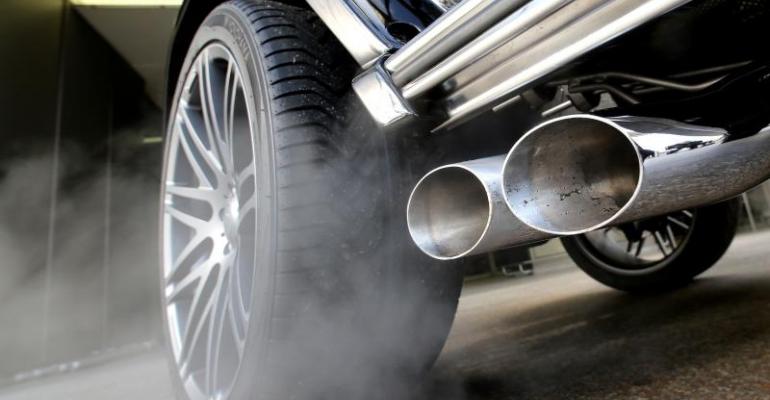BRUSSELS – A European Parliament probe into the Dieselgate scandal kicks off with a row over how far European Union legislators should go in finger-pointing at the car industry during the yearlong probe.
For the center-right European People’s Party, the European Parliament’s largest political group, Latvian MEP Krišjānis Kariņš warns the new Committee of Inquiry into Emission Measurements in the Automotive Sector: “The EPP will do its utmost to prevent this committee from becoming what could be termed as a witch hunt either against industry or against diesel technologies where Europe has a competitive advantage in the world.”
Kariņš tells the committee’s inaugural meeting March 2 “it is false to pit industry against the environment. Europe needs jobs, Europe needs industry and our task is to square that with, of course, the needs of the environment.”
The EPP, which originally opposed the establishment of an inquiry, later issued a statement saying the committee’s mandate “has been clearly defined to investigate different aspects of the work of the European Commission (the EU’s executive branch) and the European Union member states in the area of car emissions.”
Kariņš promises he and his EPP colleagues “will be watching that the committee sticks strictly to its mandate and that it doesn’t derail into a political folly.”
But horse-trading over the committee’s work program is set for a March 22 meeting with the committee chair, Belgian Socialist MEP Kathleen van Brempt, who says members “will have a set of proposals by then.”
In a statement from the parliament’s socialist group, van Brempt argues the committee “should leave aside any partisan divide” and focus “on what went wrong and shining a light on why the fraudulent software installed in Volkswagen diesel vehicles was detected by United States authorities and not by those responsible in the EU.”
The parliament’s Greens/European Free Alliance group issues a wish list for the investigation at a news conference after the March 2 meeting, stressing the committee should “interrogate” the auto industry, both individual automakers and the ACEA industry group. Dutch Green MEP Bas Eickhout, responding to Kariņš’ witch-hunt warning, says, “In the end we want to know who was responsible for what.”
German Green MEP Rebecca Harms claims the inquiry “will be the opposite of a witch hunt” and “will contribute to innovation which is urgently needed in the automotive sector.”
Eickhout later comments, “In the end it’s about clean air and not against diesel.”
Outlining questions the Greens want to see answered, Eickhout notes there is “a lot of information out there” and the committee should “get our facts straight” about the differences between real emissions and those measured in laboratory tests.
The Greens also want the committee to look at the relationship between institutions and manufacturers as well as the role in national-type-approval that authorities played.
“We need to get over this incestuous link between national authorities and the automotive industry,” French Green MEP Karima Delli says.
Calling in the Americans
The Greens want the U.S. EPA to testify before the parliamentary committee.
Eickhout says the Greens want to hear from U.S. regulators because American and European legislation both outlaw so-called defeat devices used to circumvent emissions caps, but the two jurisdictions define such devices differently.
“U.S. regulations are judging differently and (are) tougher (on) what they think are defeat devices,” Eickhout says, noting that unlike the U.S., the EU allowed software that could have helped VW generate faulty emissions data. “When does software become a defeat device?”
Jürgen Resch, CEO of the German environmental group Deutsche Umwelthilfe, claims at the news conference the inquiry could generate revelations about other manufacturers: “I think we have less than 20% of the scandal on the table,” he says.
Resch was scathing about industry’s attempts to get around testing, pointing out that because Opel cars have General Motors-built engines, “it’s also an American problem.”
Delli also cites important differences between European and American testing that could be probed by the committee, with the U.S. testing five cycles to the EU’s one. Moreover, U.S. vehicles are re-tested if cheating is found or suspected, she says.
Another key difference Delli notes is the transparency of U.S. assessments, with regulators releasing letters to manufacturers asking why emissions are five times higher than allowed. “So you have the pressure,” the French Green MEP says.
Eickhout also argues the new real-driving emissions test the EU is adopting is not cheat- proof. “We haven’t solved everything by just moving to real-driving emissions.”
Resch agrees, pointing to ways automakers could get the best results from testing, claiming they might provide a “golden” car specially prepared for tests rather than have regulators pick one off the street.
“A spare tire will not be (on) that golden car,” the German environmentalist says.
ACEA does not respond to questions from WardsAuto regarding the points raised at the Green news conference, nor whether it believes it is facing a witch hunt. But a spokesperson says the association takes note of the committee constituent meeting.
“The newly elected chairwoman emphasizes that the committee’s objective is to explore how EU legislation can be better implemented and enforced,” the spokesperson says.
“The industry, which employs 12.1 million Europeans, recognizes the importance of having robust environmental legislation in place and is ready to work with the committee should this be required. In parallel, ACEA will continue to contribute constructively to the ongoing process of updating and strengthening emissions-testing requirements, including the forthcoming Real Driving Emissions test.”





